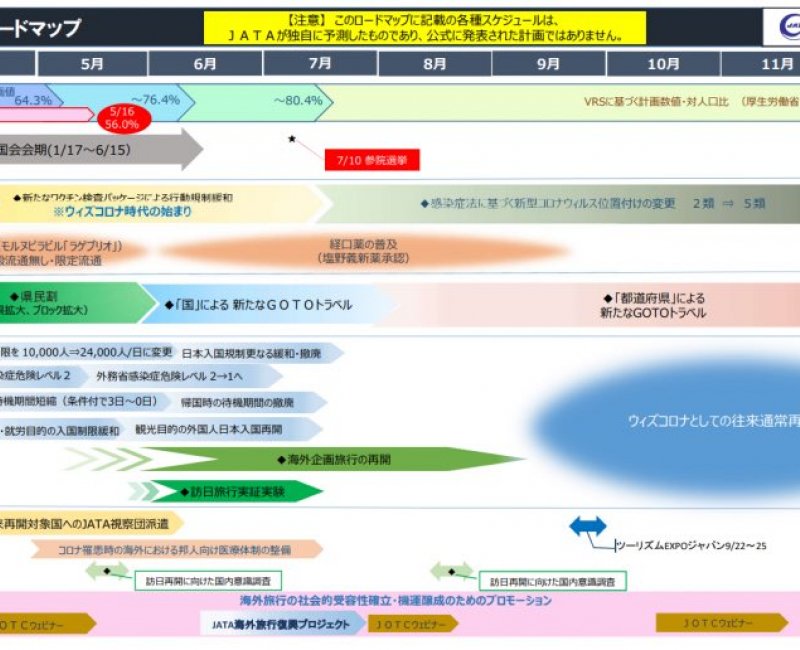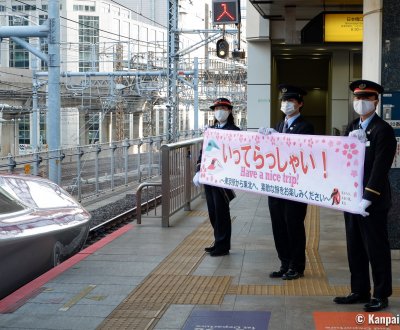Last (?) Slap Before Reopening to Tourists: Japan Introduces North-Korean Style Package Tours
Japan delivered a new blow to all who had been waiting over the past 26 months: while it does indeed start as soon as May, its reopening to tourism will proceed by phases over several months before recovering to pre-pandemic levels.
The good news is that, after much pressure, the Japanese government has finally started to tackle the comeback of tourists on its territory and to define a roadmap.
On the flip side, it is done with much dithering and following the slowest timeline possible, pursuant to its insular and rigid tradition.
👼 Kishida’s words...
On an overseas trip, Japanese Prime Minister Fumio Kishida announced at a press conference in London on May 5: "the next easing coming in June when Japan will start a smoother accession process similar to the rest of the G7".
Consequently, a lot of medias outlets have hurriedly published copied-pasted articles with clickbait titles such as "Japan allowing tourists in June". And happy and trusting travelers to book their flight ticket and their accommodation for this summer without checking any further…
The very optimistic Western interpretation indeed understood that tourists would be allowed back in Japan like in 2019 as soon as next month.
However, the Japanese meaning is more subtle literal: it most certainly only means giving up the Covid test upon landing in Japan (which overburdened Narita airport with up to 5 to 8 hours waiting lines), and solely relying on the still mandatory negative PCR test before boarding the plane ✈️.
There is however an important condition: the potential uptick of Covid cases post-Golden Week. And it naturally happened: even if very limited, the Covid contamination curb slightly went upwards after the national holiday week. Nobody should be surprised knowing that crowds of Japanese vacationed those few days in Hawaii (among other destinations) between the end of April and early May. We have already explored this Japanese hypocrisy in a recent article:
As a reminder, since March 1rst Japan has already been allowing all visas holders except tourists:
- Short and long term students;
- Businesspeople, interns, associations, artists and even working holidays visas;
- Spouses and families of Japanese residents.
Many of the later even received the unexpected "temporary visitor" status (with all the advantages related, such as the access to the JR Pass), making them de facto tourists:
👹 ... and the recovery’s harsh reality
Less than 2 weeks after Kishida’s encouraging statement, the Japanese government did not fail to disappoint by giving a coy announcement on the actual implementation of tourism resuming in Japan.
Starting on May 24, tourism will resume with test-package tours, under the following conditions:
- Participants from only 4 countries: United States, Australia, Singapore and Thailand (other will be included later, such as Hong-Kong),
- Only 10 triple-vaccinated persons per group, with private medical insurance,
- Permanent mentoring by guide(s) of a selected Japanese travel agency,
- On a pre-determined itinerary, and staying in hospitality establishments that have approved them beforehand,
- In only in 15 of the 47 prefectures (Tokyo, Osaka, Hokkaido and Okinawa don’t participate),
- Interdiction to use public transport (except for some specific trains booked in advance).
Through these closely monitored tours, the aim is to assess Japan’s response capacity in case of a positive case, and to deliver guidelines to the hospitality industry and travel agencies in view of the future and more extensive resuming.
However, don’t bother contacting your travel agency to participate in these package tours, that certainly remind of North-Korean guided tours… Actually, only (one?) travel agencies close to the Japanese government are allowed to organize and operate these trips, which are designed for a timely travel without moment of freedom for travelers.
By the end of May, there will be more or less 40 tourists in Japan. In total, 10 to 15 test-groups will be used as guinea pigs, namely about 100 to 150 test-travelers. And they are likely to be carefully screened, for example by the travel agencies’ local partners.
Lastly, no need to argue on the very debatable choice of these 4 countries, just look at the volume and the rising number of new Covid cases in the US. Other countries will probably be admitted in the list over the next weeks but, as we said, it is deceptive.
😡 Japan criticized from all sides
Naturally, facing this huge blow by the Japanese government, voices have started to rise louder than before.
It goes without saying, tourists in the first instance:
- Some have been waiting since early 2020 and are fed up with always postponing their travel,
- Others have been dreaming of Japan before or since the Corona times and are desperate to see the archipelago open again.
Other blind spot in this interdiction: the partners, fiancés, and non-married couples, who are not acknowledged by the Japanese law and cannot be reunited with their significant other in Japan.
With heavier arguments, leaders of the world’s large countries (especially in the European Union, the United States or South Korea) rightfully start to rebuke the lack of reciprocity of the visa waiver. Indeed, as highlighted by 2022 Golden Week, although it already happened with Europe in 2020 and the USA in 2021: the Japanese are freely traveling in our countries but are still refusing us the right to visit.
Among the international institutions, heavy weights are pointing the finger at the archipelago, especially:
Even within Japan criticism is increasingly harsher: beyond the Japanese Business Federation Keidanren that has been lobbying since 2020, it is now inside the Jiminto / LDP (party that has been ruling for nearly seventy years almost uninterrupted) that voices are rising, in a domestic context where face mask 😷 is not recommended anymore in the outdoor.
🕊 Individual tourism must wait a little bit longer
The true reopening to free tourism will be determined by the results of the test-package tours.
Knowing how the Japanese work, we will have to wait for an Excel reporting, approved by several hierarchical levels before endorsement by the government’s advisors.
Now, what we are all waiting for is the date of the comeback of non-monitored individual travelers. As we have been writing on Kanpai since early March, it is likely to happen in the next summer (let us remind that summer is the period defined between June 21 to September 21).
Some big, very reliable, Japanese media, announced a comeback from June:
- "Japan plans to further open its borders to foreign visitors in June at the earliest" according to Kyodo press agency,
- "toward the full-scale reception of foreign visitors planned for June" optimistically adds the Mainichi newspaper,
- "broader easing of COVID-19 🦠 border control measures slated for June" states more cautiously the economic newspaper Nikkei.
Insiders also hint on a phased reopening likely to start in September (with a further raise of the daily caps) and unfolding in stages until December (for entry without any restrictions).
It seems the Japan Tourism Association (JATA) has suggested the government a complete reopening in 6 gradual stages, and needless to say, without quarantine.

To sum it up, nothing is clear at the moment, and we still have to wait for upcoming announcements.
Don't miss the announcements on the borders' reopening and make sure to get information on real time, subscribe to the free Kanpai’s Newsletter:
Kishida is still trying to save time and stall the reopening, probably in view of July 25’s House of Councilors election that is critical for asserting his authority on the LDP for the next 3 years.
But he is straddling the fence at the risk of alienating everyone.
🎢 The Japanese hurdles before restrictions lifting
The Japanese public opinion, very reluctant to the reopening of the borders since the advent of Covid, is slowly but surely changing its mind. In the latest great survey, only a short majority (52%) was still favorable to the isolation.
The main reason, aside the country being one of the last still closed: the sluggish economy, a cynical "opportunity" as it fosters the need for decision making.
In the context combining a lack of growth, a booming inflation (therefore a stagflation) and the long-lasting weakness of Yen 💴, Japan’s closing to tourism already cost ¥22 trillion (~143.2 billions dollars)
It has already been decided the daily entry cap in the archipelago would rise from 10 to 20,000 from June 1rst, and that it should continue to rise in the next weeks and months. To tell the truth, nobody was able to explain how this threshold was determined and we wonder if it is not just mere advertising.
As a reminder, while the cap was 3,500 at the end of February, the average before Covid was comprised between 100 and 150,000 arrivals per day in 2019.
After a 3rd spring 🌸, it is almost certain that tourism in Japan will also lose a 3rd consecutive summer. Indeed, even if Japan reopened in early July for example, very few would be able to organize and book a travel at the last minute.
If it is not already too late, some of the archipelago’s fans are likely to choose another "challenger" destination. Ironically, Japan’s best enemy South Korea announced a further easing of its tourist’s entry procedure, that was already rather relaxed.
At a time of an increasing number of destinations available without any constraint, Japan continues to tarnish its image at international level, and to ridicule its status of a G7 country. It is the last destination to remain closed, along with China, North Korea, Syria, Turkmenistan, Myanmar, and Bhutan…
But the bigger risk from an outsider point of view, is Japan to endorse the increasingly widespread idea, that regardless of the challenges, the number of foreigners on its territory should stay low, something that suits the country well.
We will never stop loving Japan, although it certainly is going into great lengths to make things difficult.




